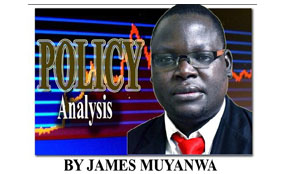 AS I break off for my annual vacation, I have decided to have a glance at the national economic performance recorded this far in comparison with the annual macro-economic targets for 2014.
AS I break off for my annual vacation, I have decided to have a glance at the national economic performance recorded this far in comparison with the annual macro-economic targets for 2014.
Just to pep up the memories, the Government, through the 2014 National Budget, which Finance Minister Alexander Chikwanda unveiled to Parliament on October 11 2013, has six main macro-economic objectives for the year.
It projected to achieve a real Gross Domestic Product (GDP) growth of above seven per cent, which was later adjusted following the rebasing of the national accounts from the base year of 1994 to 2010.
Further, the government targets to create at least 200,000 decent jobs, while in terms of inflation it aims at attaining the end-year inflation rate of not more than 6.5 per cent.
The other objective is to increase international reserves to over three months of import cover while maintaining a fiscally sustainable public external debt level so that debt service and amortisation do not exceed 30 per cent of domestic revenues.
To lessen reliance on foreign budgetary support the government aims at increasing domestic revenue collections to more than 21 per cent of GDP and lastly it targets to limit domestic borrowing to 2.5 per cent of GDP and contain the overall deficit to not more than 6.6 per cent of GDP.
It, however, looks like an uphill battle to achieve most of these objectives especially given that the Zambian economic journey was so rocky during the first half of this year.
The economy, for instance, is yet to fully recover from the effects of the record-low value of the Kwacha recorded in the second quarter when it even crossed the K7-per-United States (US)-dollar mark.
The dear Kwacha depreciated by approximately 25 per cent, which was highly unprecedented.
Obviously, the poor performance of the Kwacha affected almost all the other economic indicators including inflation in that importers had to folk out much more Kwacha when importing any goods than they would have otherwise done if the Kwacha was stable.
That automatically translated into high cost of doing business for those importers who ultimately passed on the cost to the local consumers thereby leading to higher prices of, especially, imported goods on the local market.
This, coupled with the increase in the electricity tariffs by Zesco and a few other adverse conditions, with their ripple effects, explains the increase in the rate of inflation recorded for last month from 7.9 to eight per cent.
To expect the inflation rate to fall from eight per cent it recorded in July 2014 to below 6.5 per cent is being overoptimistic.
Therefore, it is almost impossible to achieve that target. Sadly, these negative factors have even managed to water down the perennial rise in the value of the Kwacha recorded around harvest time.
The economy for Zambia, which relies on seasonal agriculture, picks around this time due to lower prices of foodstuffs as the result of the harvests.
Then obvious, as already alluded to, the rise in the cost of doing business could also negatively impact on the job creation crusade because the employers would have to at least maintain the workforces as opposed to increasing them.
Given the amount of infrastructural development which is going on around the country, some jobs have been created but the question could be, how decent are they and are they sustainable?
Interestingly, the Bank of Zambia says available indicators suggest the government is on track in meeting its growth objective for 2014 which is now estimated at 6.5 per cent of the rebased GDP.
According to BoZ Governor, Michael Gondwe’s Monetary Policy Statement issued on August 5 2014, most of the selected real sector development indicators recorded higher output than projected.
Notably, for once, the BoZ sounded cautiously optimistic on most of these indicators which should be the case because there is no need to be overconfident only to come back and retract that.
But in my view apart from being cautiously optimistic the BoZ officials should spend more time and energy in telling the nations what they intend to do to keep the Kwacha, and other macroeconomic indicators within their jurisdictions, buoyant.
There is need to continue assuring the nation and investors that these learned experts are doing something, know what they are doing and they are on top of things!
This will further help in inspiring confidence in the national economy by citizens, investors and the international community.
*****
As I proceed on my annual leave, I am taking a break from this column and leave you with a colleague, Brian Hatyoka, who will warm the seat until I return in October this year. I hope and trust that you will offer Brian the required support as you have always done to me.
Bye for now and God Bless you!
For contributions call: 0955 431442, 0977 246099, 0964742506 or
e-mail: jmuyanwa@gmail.com.






